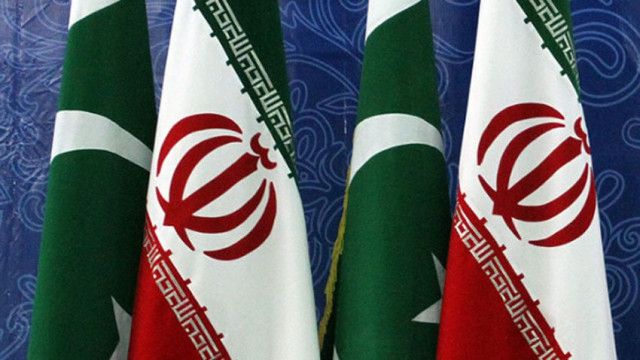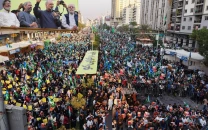De-escalation imminent as friends engage in hectic diplomacy
With three key regional players working behind scenes, Tehran indicates it is ready to lower tensions too

In a significant development, Islamabad and Tehran sought to de-escalate tensions after Pakistan launched retaliatory strikes inside Iran on Thursday, threatening a full-scale conflict between the two neighbours, according to officials and diplomatic sources.
Pakistan after conducting the missile strikes sent a reconciliation message to Iran and told the neighbouring country that it had no interest in further escalating the tensions.
With three key regional players working behind the scenes, Tehran indicated it was ready to lower the tensions too.
The Iranian foreign ministry late evening issued a statement stating that Tehran “adheres to its policy of good neighbourly ties with Pakistan”.
More importantly, the Iranian readout stated it would not allow enemies to strain ties between the two countries.
Officials here interpreted the Iranian statement as a positive signal and the first sign that it was ready to mend ties with Pakistan.
Apparently, the two countries have pulled back from the brink thanks to overt and covert efforts by key regional countries, pushing the two sides not to further escalate tensions.
There was cautious optimism among the Pakistani officials about the lowering of tension. “We hope the worst is over,” remarked one official while requesting anonymity.
The spectre of potential conflict between the two countries looms large after Pakistan conducted coordinated and precision-guided strikes targeting terrorist hideouts across the border inside Iran.
Sensing the brewing tensions, key regional players and friends of both Pakistan and Iran swung into hectic diplomatic efforts, seeking immediate de-escalation. Sources told The Express Tribune that China, Russia, and Turkey were active to prevent the crisis.
Turkish Foreign Minister Hakan Fidan spoke to his Pakistani and Iranian counterparts hours after Pakistan’s counter strikes and urged them to show restraint.
Speaking at a news conference in Amman, Jordan, Fidan said: “Our region does not need more problems and conflicts... We have been following the developments between Pakistan and Iran with concern.
“We, as Turkey, recommend that the issue does not escalate further and urge that calm be restored as soon as possible.”
Fidan said both the Iranian and Pakistani ministers told him that they did not want an escalation and that the situation “was under control”.
“I hope that the issue between the two brotherly nations does not escalate,” Fidan said. “We will continue to do whatever falls on us to reduce the tension between Pakistan and Iran.”
Russia too voiced serious concerns over the unprecedented tensions between Iran and Pakistan.
While Russian diplomats engaged both the countries from behind the scenes, Russia’s foreign ministry called on Iran and Pakistan to show “maximum restraint” and solve their differences through diplomacy or risk playing into the hands of those who would like to see the region descend into chaos.
Russian Foreign Ministry spokesperson Maria Zakharova in a statement noted that the two countries are part of the Shanghai Cooperation Organisation (SCO), a grouping that Russia helped found.
“It is regrettable that this is happening between friendly SCO countries, with which we are developing partnership relations. Further aggravation of the situation plays into the hands of those who are not interested in peace, stability, and security in the region,” Zakharova said.
Any anti-terrorist operation on another country’s sovereign territory had to be carried out in agreement and coordination with the authorities of that country, she added.
Read Iran attack: locals still in state of panic
China, having close ties with both Iran and Pakistan, also expressed concerns, saying it was ready to mediate between the two countries.
Foreign Office sources told The Express Tribune that there was no intention on part of Pakistan to escalate the tension.
“The ball is in Iran’s court,” a senior official familiar with the backdoor efforts said.
“If Iran doesn’t respond further then there is a chance of de-escalation,” the official added while requesting anonymity.
The sources said that Pakistan was compelled to retaliate as it was an extremely difficult decision given that Iran was not just a neighbour but also a Muslim country.
The sources provided rare insights into the behind-the-scene discussions that led Pakistan to carry out retaliatory strikes.
Pakistan was shocked when Iran conducted missile and drone strikes in a remote region of Pangur district of Balochistan.
Instead of giving a knee-jerk reaction, Pakistani policymakers decided to buy time.
The idea was to give Iran time to come up with an explanation that might persuade Pakistan not to hit back.
The sources said that Pakistan was hoping that Iran would offer an apology or at least come with an explanation that would satisfy Islamabad.
However, when Iran did not do any such thing, Pakistan as a first step decided to recall its ambassador from Tehran and expelled the Iranian ambassador from the country.
The move was again aimed at sending a tough and clear message that Iran would have to mend ways.
Pakistan was hoping that after that move Iran would realise its mistake and approach Islamabad. But instead of coming to terms with the reality, the Iranian government started boasting its strikes inside Pakistan.
It left Pakistan with no other option but to launch strikes inside Iran.
While Pakistan did carry out strikes, it sought de-escalation in tensions by offering Iran to enter into dialogue to resolve all issues, including the issue of terrorism.
“Our policy is clear. We don’t want any escalation in tension. This does not serve the purpose of Pakistan and we are sure it is not in the interest of Iran either,” the official added, expressing optimism that Iran would not resort to any misadventure.
Meanwhile, Iran also apparently sought to lower tensions with Pakistan as its foreign ministry said Tehran adhered to its policy of good neighbourly ties and it would not allow its enemies to strain ties with Islamabad.
The Iranian official statement did condemn Pakistan missile strikes but overall contents of the readout suggested that it now wanted to de-escalate.
Terming the Pakistani attacks as “unbalanced and unacceptable”, the Iranian government did admit that those strikes killed “non-Iranian villagers”.
But the statement added: “At the same time, the Islamic Republic of Iran adheres to the policy of good neighbourliness and brotherhood between the two nations and the two governments of the Islamic Republic of Iran and Pakistan. It does not allow enemies to strain the amicable and brotherly relations of Tehran and Islamabad.”
The statement provided a detailed explanation of the Iranian missile strikes of Jan 16.
It said the Border Taskforce of the Islamic Revolution Guards Corps (IRGC) Ground Force, situated in Sistan-Baluchistan province, took a preventive action against a terrorist group, preparing to infiltrate the Iranian territory to carry out another terrorist operation similar to the criminal and terrorist attack in Rask.
The action was carried out against the terrorist group’s barracks and headquarters located in the heights of the region, kilometres away from residential areas—a procedure which is part of the inherent duties of the border forces of the Islamic Republic of Iran to “proportionately deal” with any “imminent terrorist threat” against the people and citizens of the country, according to the statement.
The statement emphasised that the Islamic Republic of Iran “differentiates between Pakistan’s friendly and brotherly government and armed terrorists”.
“The Islamic Republic of Iran always adheres to its policy of good neighbourliness and does not allow its enemies and terrorist allies to strain these relations, especially when the genocide and crimes of the Zionist regime are the foremost issue, affecting the Islamic world,” the statement further read.



















COMMENTS
Comments are moderated and generally will be posted if they are on-topic and not abusive.
For more information, please see our Comments FAQ